Key takeaways:
- Selective mutism is an anxiety disorder affecting children’s ability to speak in certain situations, often stemming from extreme shyness and fear.
- Celebrating small speaking victories boosts children’s confidence and promotes a supportive environment for communication.
- Building a support network helps families share experiences and strategies, creating a sense of belonging and encouragement.
- Documenting progress and reflecting on growth can highlight achievements, reinforcing motivation and resilience in overcoming selective mutism.
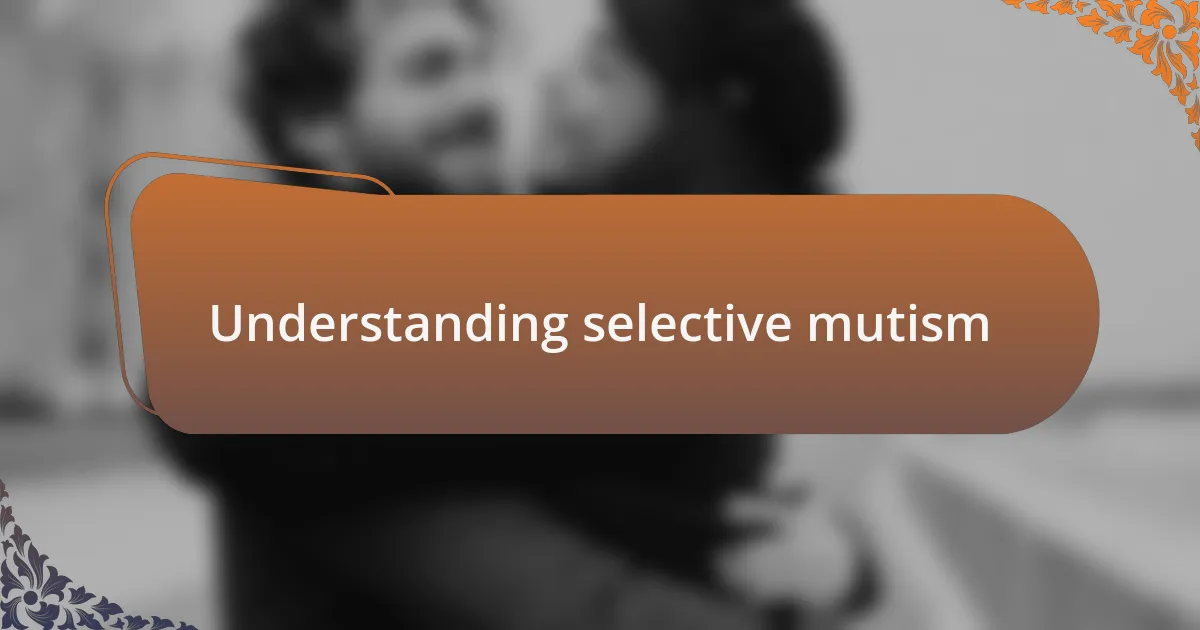
Understanding selective mutism
Selective mutism is more than just a difficulty in speaking; it’s an anxiety disorder that primarily affects children, causing them to be unable to speak in certain social situations despite having the ability to communicate in others. I remember a time when a child I knew would giggle with friends at recess but couldn’t utter a word in the classroom. It’s heartbreaking to witness, isn’t it?
This condition often stems from extreme shyness and fear, creating a barrier that impacts a child’s social and academic success. Imagine standing in a room full of people yet feeling completely invisible, like your voice is trapped inside. It’s a feeling I’ve seen reflected in many young faces as they grapple with the pressures of social interaction.
What can be even more challenging is understanding that selective mutism is not a deliberate choice to be silent; it’s a genuine struggle. For some kids, the thought of speaking up can trigger overwhelming anxiety, leaving them feeling isolated and misunderstood. Have you ever felt a similar pressure in a social setting? It’s crucial to create a supportive environment for these children, encouraging them to express themselves at their own pace.

Importance of celebrating wins
Recognizing small speaking wins can significantly boost a child’s confidence. I recall a young girl who, after weeks of silent struggle, finally spoke up during a class discussion. The joy on her face was unmistakable, and it reminded me how powerful those small moments can be in reinforcing their self-worth and social presence.
Celebrating these victories, no matter how minor they seem, helps to normalize the journey of overcoming selective mutism. Each small win serves as a stepping stone, creating a sense of accomplishment that can catalyze further progress. Have you noticed how a word of encouragement can spark motivation? It’s essential to acknowledge these moments, as they can inspire the child to take even bolder steps forward.
Furthermore, these celebrations create a supportive atmosphere where children feel safe to express themselves. I often share stories with my friends about how a simple “well done!” after a hesitant word can lead to larger conversations. When children see their efforts appreciated, it gradually diminishes their anxiety and paves the way for more meaningful interactions. What could be more rewarding than witnessing a child take their first, confident steps toward communication?
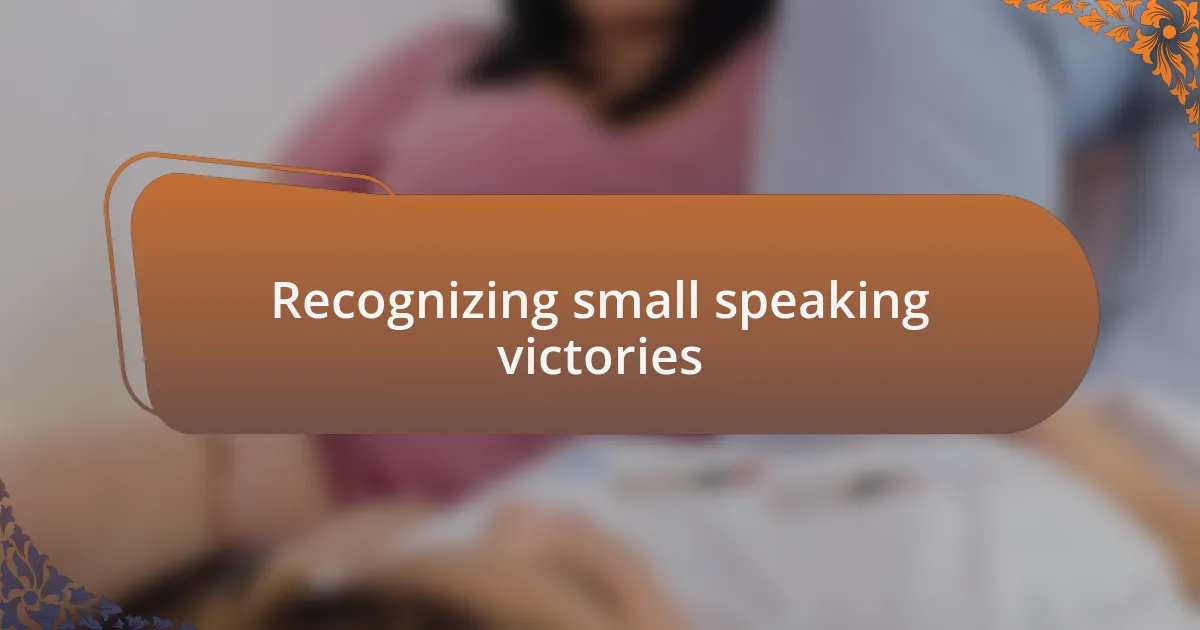
Recognizing small speaking victories
Recognizing small speaking victories is crucial in validating the struggles faced by children with selective mutism. I remember a moment in a therapy session when a boy, who typically remained silent, managed to ask for help with his toy. The wide-eyed surprise on his face as he realized he had effectively communicated his needs was a powerful reminder of how significant these small acts can be.
Each time a child strings together even a few words, it’s essential to celebrate that achievement. I often find myself capturing these moments in a journal, documenting the expressions and feelings involved. Reflecting on those experiences not only reinforces the importance of their efforts but also provides a tangible record of progress that can be revisited during tougher times.
In my experience, acknowledging these small victories often leads to deeper conversations. I once witnessed a child who, after sharing a hesitant greeting, opened up about his favorite book. That exchange, which may seem trivial to some, laid the foundation for a deeper bond and enhanced communication. Have you ever noticed how a simple acknowledgment can transform a child’s reluctance into eagerness? These victories are not just milestones; they serve as a gentle reminder of the courage lying within each child.

Personal strategies for celebration
Celebrating small speaking wins can be both personal and meaningful. For instance, I like to create a special ritual after a child utters their first word or even expresses a thought. Perhaps we’ll share a favorite treat together or even do a fun activity they enjoy. This creates a positive association with speaking and makes the child feel cherished, reinforcing their courage to engage more.
One strategy I find particularly impactful is using visual aids, like a progress chart. I remember working with a child who was initially hesitant to speak in a group. We tracked each brave attempt with a colorful sticker on their chart. Watching those stickers accumulate over time was not just motivating for them; it became a visual celebration of their journey. Have you ever considered how a simple chart can provide so much encouragement?
I also encourage parents to share these moments with friends and family. I recall a parent who chose to send a video message of their child’s first spoken words to relatives. The joy radiating from both the child and the family members was immense. It’s a reminder that celebrating these victories isn’t just about the immediate moment—it’s about building a supportive community around a child’s journey to find their voice. How do you think sharing wins with others might amplify their significance?
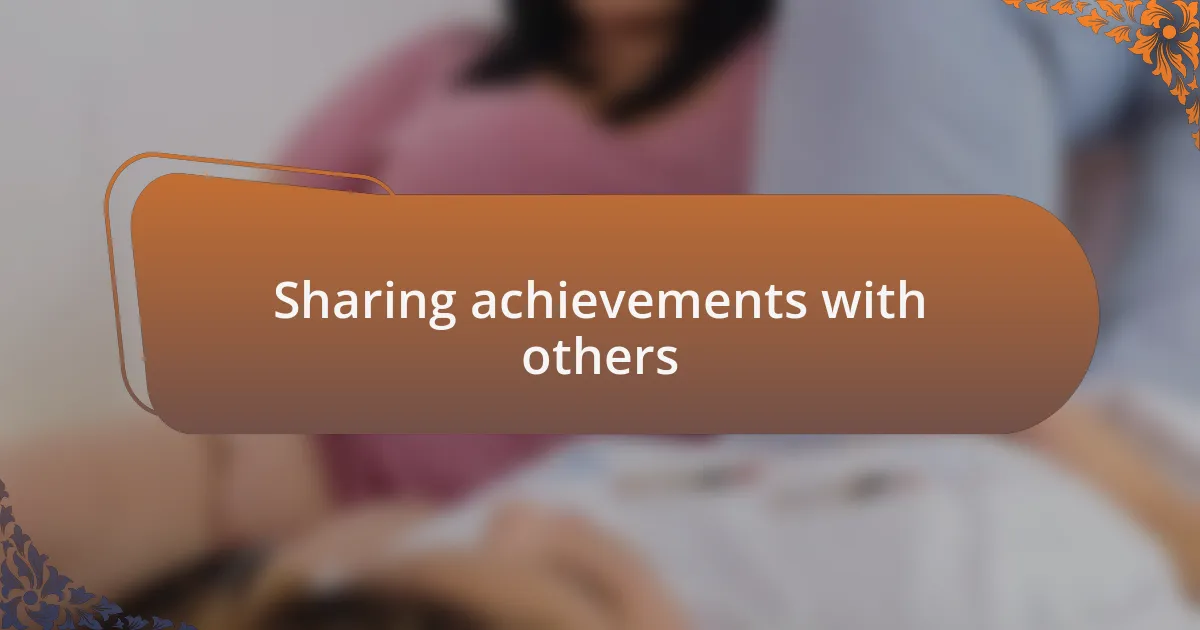
Sharing achievements with others
When I share a child’s achievements, it feels like lighting up a room. For example, I once celebrated a young girl who finally spoke up during a group discussion. I encouraged her to share this breakthrough with her close friends, and the pride in her eyes when they cheered her on was unforgettable. Have you ever seen how a simple acknowledgment from peers can magnify a moment of triumph?
I often find that sharing these milestones with others creates a ripple effect of support. One parent I know invited a few friends over for a small gathering just to showcase her child’s speaking accomplishments. The warmth and encouragement that filled the room fostered a sense of belonging for the child. Isn’t it incredible how inviting others into our victories can strengthen our connections and encourage even greater bravery?
Additionally, I believe that sharing achievements provides a chance to reflect on the journey taken to get there. When I tell my friends about the progress a child has made, it reminds me of the challenges they faced. This reflection not only brings joy but also creates a narrative of resilience. How often do we pause to appreciate not just the win, but the path that led to it?
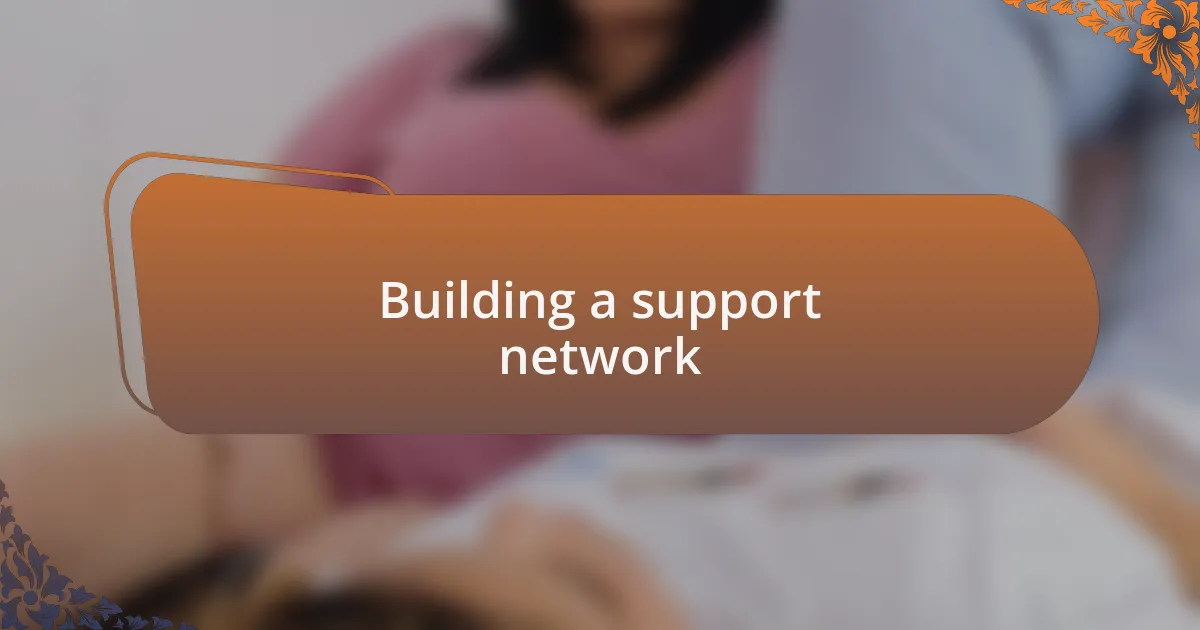
Building a support network
Building a support network is essential for anyone navigating selective mutism. I remember attending a local support group where parents shared their experiences and strategies. When one mother expressed her fears about her daughter’s quietness, it struck a chord with me. We often underestimate the power of camaraderie in these situations, don’t we? Sharing my own journey helped her feel less isolated, reminding me how vital it is to connect with others facing similar challenges.
Connecting with like-minded individuals can create a safe haven for sharing fears and triumphs. I once facilitated a small workshop, inviting parents and children to explore effective communication tools together. Watching the kids practice speaking in this supportive environment was heartwarming. Isn’t it amazing how a shared experience can bolster confidence? I left that day feeling uplifted by the collective energy and encouragement.
Moreover, I believe that a support network opens doors to new opportunities. When friends and family understand the journey, they become allies in celebration. I recently enlisted a friend to help celebrate a milestone for a young boy who overcame his fear of speaking in a new setting. The joy on his face as he received acknowledgment from an expanded circle was priceless. Isn’t it reassuring to know that we don’t have to walk this path alone?
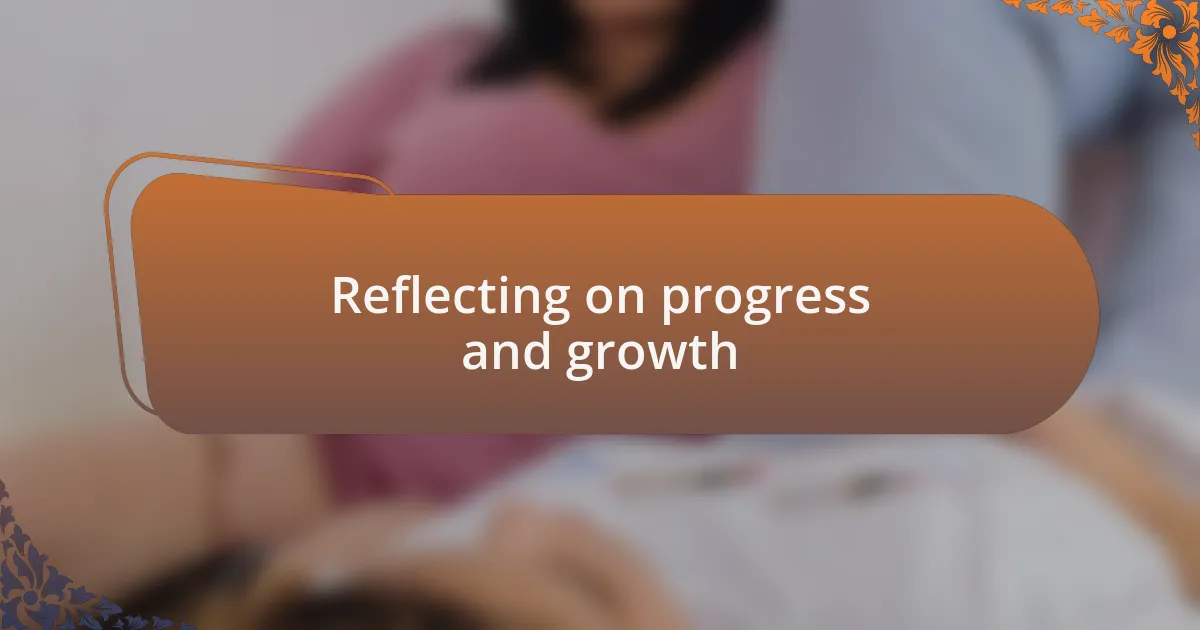
Reflecting on progress and growth
Reflecting on progress and growth can often be a transformative experience. I remember the first time I heard my daughter speak up in a group setting—it was as if a light had turned on. In that moment, I realized just how far she had come. Isn’t it incredible when we pause to acknowledge these small victories? Each step forward can ignite a sense of hope, serving as a reminder that growth happens gradually, and every little achievement matters.
As I look back on our journey, I often find myself appreciating the incremental steps that lead to breakthroughs. There were days when it felt like we were moving at a snail’s pace, but I began to celebrate even the smallest expressions of creativity and confidence. For instance, when she chose to share a simple thought during a school project, it was a pivotal moment that I cherish. How often do we overlook these stepping stones on our path to growth?
Reflecting has taught me the importance of documenting these milestones. I started keeping a journal where I noted her speaking successes, no matter how minor they seemed. This practice allowed me to visualize her progress over time and fueled my motivation. Don’t you find that capturing moments can truly help to highlight our achievements and bolster our resilience? It’s a gentle reminder that growth is a journey fueled by persistence and love.